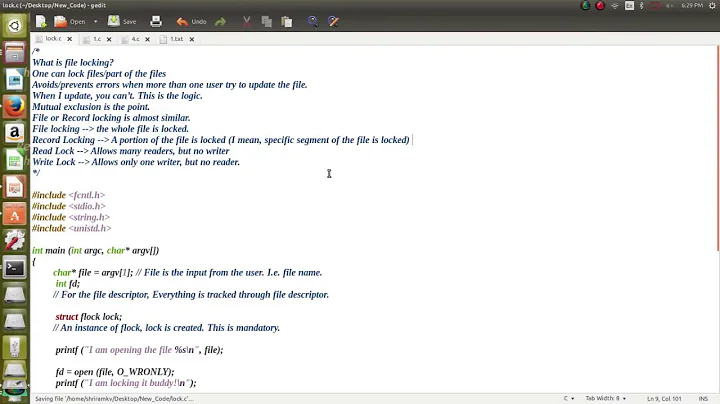What Unix commands can be used as a semaphore/lock?
Solution 1
If lockfile is not installed on your system, then mkdir will do
the work: it's an atomic operation, and it fails if the directory
already exists (as long as you don't add the -p command-line
switch).
create_lock_or_wait () {
path="$1"
wait_time="${2:-10}"
while true; do
if mkdir "${path}.lock.d"; then
break;
fi
sleep $wait_time
done
}
remove_lock () {
path="$1"
rmdir "${path}.lock.d"
}
Solution 2
#!/bin/bash
# Makes sure we exit if flock fails.
set -e
(
# Wait for lock on /var/lock/.myscript.exclusivelock (fd 200) for 10 seconds
flock -x -w 10 200
# Do stuff
) 200>/var/lock/.myscript.exclusivelock
This ensures that code between "(" and ")" is run only by one process at a time and that the process does wait for a lock too long.
Solution 3
lockfile(1) looks like a good candidate, though beware that it's part of the procmail package, which you may not have installed on your machine yet. It's a popular enough package that it should be packaged for your system if it's not installed yet. Three of the four systems I checked have it, and the other has it available.
Using it is simple:
#!/bin/sh
LOCKFILE=$HOME/.myscript/lock
mkdir -p `dirname $LOCKFILE`
echo Waiting for lock $LOCKFILE...
if lockfile -1 -r15 $LOCKFILE
then
# Do protected stuff here
echo Doing protected stuff...
# Then, afterward, clean up so another instance of this script can run
rm -f $LOCKFILE
else
echo "Failed to acquire lock! lockfile(1) returned $?"
exit 1
fi
The options I've given make it retry once a second for up to 15 seconds. Drop the "-r" flag if you want it to wait forever.
Solution 4
The system call mkdir() is atomic on POSIX filesystems. So, using the mkdir command in such a way that it involves exactly one call to mkdir() would achieve your purpose. (IOW, don't use mkdir -p). The corresponding unlock is rmdir of course.
Caveat emptor: mkdir() might not be atomic on network filesystems.
Solution 5
Maybe the lockfile command will do what you need.
lockfile ~/.config/mylockfile.lock
.....
rm -f important.lock
Related videos on Youtube
Joe Chin
Updated on September 17, 2022Comments
-
Joe Chin over 1 year
I want to run multiple Bash shell scripts in parallel. However, I want to avoid race conditions. What Unix commands are truly atomic that I could use for this purpose, and how can I use them?
-
Lucas Jones over 13 yearsJust for reference - the man page: linux.die.net/man/1/lockfile. :)
-
heyman over 13 yearsNice one, didn't know about it. However, it's apparently Linux-specific...
-
 Alex B over 13 years@Riccardo, FreeBSD has a similar command:
Alex B over 13 years@Riccardo, FreeBSD has a similar command:lockf(1). -
Charley over 7 years
lockf(1)doesn't work in the way used in this example, though. It can't take a file descriptor number as an argument. -
 Alexej Magura almost 7 yearsis
Alexej Magura almost 7 yearsisrmdirtherefore also atomic? -
Jay over 5 yearsBe aware that (according to the manpage), "Once a file is locked, the lock must be touched at least once every five minutes or the lock will be considered stale, and subsequent lock attempts will succeed."
-
 Benjamin W. almost 5 yearsThis seems to delete the wrong file.
Benjamin W. almost 5 yearsThis seems to delete the wrong file. -
 HappyFace almost 4 years@RiccardoMurri
HappyFace almost 4 years@RiccardoMurribrew install discoteq/discoteq/flock -
 Socowi over 3 yearsShorter but equivalent:
Socowi over 3 yearsShorter but equivalent:flock -w 10 /var/lock/.myscript.exclusivelock -c '# do stuff'. No need for( ... ) 200> ...if you only execute a few simple commands. However, if you want to modify the environment (for instance, assign a variable inside the lock for later use) then use{ ... } 200> .... -
 christianlc over 3 yearsthis is the correct answer - flock is available on all linux distros and as @HappyFace commented, available as ok'ish port for bsd
christianlc over 3 yearsthis is the correct answer - flock is available on all linux distros and as @HappyFace commented, available as ok'ish port for bsd -
 christianlc over 3 years10 years late, but the correct answer then, and now ,is flock, discussed below (unix.stackexchange.com/a/291/343121)
christianlc over 3 years10 years late, but the correct answer then, and now ,is flock, discussed below (unix.stackexchange.com/a/291/343121)




